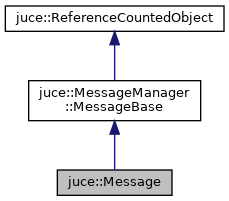The base class for objects that can be sent to a MessageListener.
More...
#include <juce_Message.h>
The base class for objects that can be sent to a MessageListener.
If you want to send a message that carries some kind of custom data, just create a subclass of Message with some appropriate member variables to hold your data.
Always create a new instance of a Message object on the heap, as it will be deleted automatically after the message has been delivered.
- See also
- MessageListener, MessageManager, ActionListener, ChangeListener
@tags{Events}
◆ Ptr
◆ Message()
| juce::Message::Message |
( |
| ) |
|
|
noexcept |
Creates an uninitialised message.
◆ ~Message()
| juce::Message::~Message |
( |
| ) |
|
|
override |
◆ decReferenceCount()
| void juce::ReferenceCountedObject::decReferenceCount |
( |
| ) |
|
|
inlinenoexceptinherited |
Decreases the object's reference count.
If the count gets to zero, the object will be deleted.
References jassert.
◆ decReferenceCountWithoutDeleting()
| bool juce::ReferenceCountedObject::decReferenceCountWithoutDeleting |
( |
| ) |
|
|
inlinenoexceptinherited |
Decreases the object's reference count.
If the count gets to zero, the object will not be deleted, but this method will return true, allowing the caller to take care of deletion.
References jassert.
◆ getReferenceCount()
| int juce::ReferenceCountedObject::getReferenceCount |
( |
| ) |
const |
|
inlinenoexceptinherited |
Returns the object's current reference count.
◆ incReferenceCount()
| void juce::ReferenceCountedObject::incReferenceCount |
( |
| ) |
|
|
inlinenoexceptinherited |
◆ messageCallback()
| void juce::Message::messageCallback |
( |
| ) |
|
|
overrideprivatevirtual |
◆ post()
| bool juce::MessageManager::MessageBase::post |
( |
| ) |
|
|
inherited |
◆ resetReferenceCount()
| void juce::ReferenceCountedObject::resetReferenceCount |
( |
| ) |
|
|
inlineprotectednoexceptinherited |
Resets the reference count to zero without deleting the object.
You should probably never need to use this!
◆ MessageListener
◆ recipient
◆ refCount
| Atomic<int> juce::ReferenceCountedObject::refCount { 0 } |
|
privateinherited |
The documentation for this class was generated from the following file:

